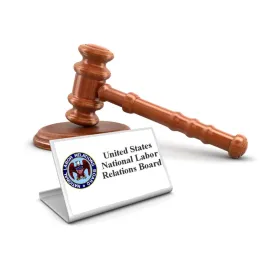Over the past few years, the National Labor Relations Board has frequently weighed in on employer’s workplace and employee handbook policies, examining whether an employer’s policy impacts employees’ rights under Section 7 of the National Labor Relations Act. Employers received a needed dose of clarity in Boeing Co., 365 NLRB No. 154 (2017), where the Board set forth rules for interpreting a facially neutral policy, rule or handbook provision. As noted at the time, employers were sure to see Boeing’s practical impact as more cases were adjudicated under its new framework. In David Saxe Productions, LLC, 370 NLRB No. 103 (2021) the Board reviewed an employer’s policies with respect to blogging and non-solicitation, applying Boeing’s test. The Board also examined the employer’s policy with respect to email signature blocks, though did not apply the Boeing framework to that rule.
Employer’s Blogging Policy
The employer’s blogging policy provided that, while acceptable when done in a professional and responsible manner, employees were not to engage in any blogging that would “harm or tarnish the image, reputation and/or goodwill” of the employer. The Charging Party union challenged this rule as an unlawful restraint on employees’ Section 7 rights. While the ALJ found that this policy violated Section 8(a)(1), the Board reversed. The Board held that under a proper application of the Boeing Category 1(b) balancing analysis, the employer’s rule had a legitimate business justification and therefore was lawful. Under the balancing test, though the rule against detrimental messages may adversely affection employees’ Section 7 rights, that concern is outweighed by the employer’s legitimate interest in protecting its reputation.
Employer’s Non-Solicitation Policy
The employer also maintained a rule that directed requests from outside people or organizations should be deferred to human resources. The ALJ found this policy to be an unfair labor practice. Again, the Board overruled the ALJ, finding that the rule was indeed lawful. While the ALJ again applied Boeing Category 1(b) balancing test, the Board held that this rule, rather, was properly analyzed as a Category 1(a) rule – meaning it is lawful if, when reasonably interpreted, it does not prohibit or interfere with the exercise of NLRA rights. Because the rule, on its face, applied to outside persons, and because “under long-settled precedent, such persons or entities have no Section 7 right to access the [employer’s] premises in the first place” except in certain inapplicable situations, the rule was indeed lawful.
Employer’s Signature Block Rule
Finally, the employer had in place an email policy stating in relevant part that employees may not customize their signature blocks. While the ALJ and Board agreed that this policy was lawful, the ALJ did so based on Purple Communications, Inc., 361 NRLB 1050 (2014), which has been since overruled. The Board instead applied Caesar’s Entertainment, 368 NLRB No. 143 (2019) and stated that there is “no precedential basis for finding that employees had the right to include Section 7-related messages in their signature blocks.” Moreover, because the employer’s rule did not permit any alteration of signature blocks whatsoever, it did not discriminate against union activity nor could it possibly have a disparate impact on union activity.
Takeaways
It is highly likely that within a year or so, the Board will return to carefully scrutinizing each fragment of an employer policy to weed out potential problems. For now, the current Board continues to apply precedent established in the past few years when analyzing workplace rules and policies. While it remains to be seen whether the Board will soon return to previous era decisions such as Purple Communications or Lutheran Heritage, which Boeing replaced, employers, for now, should take comfort in the legality of their workplace and handbook rules, policies and provisions provided their policies are facially neutral, do not interfere with employees’ NLRA rights, or whether the employer has a legitimate justification that outweighs and adverse impact to employee’s NLRA rights. The no solicitation ruling is non-controversial and perhaps was based on an error. However, because it is possible that the blogging and signature block policies found to be lawful in this case could be found unlawful soon, employers should monitor developments at the NLRB closely.





 />i
/>i
